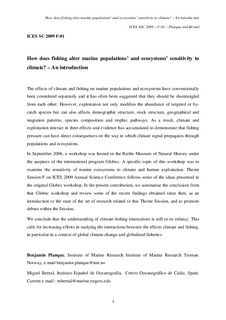How does fishing alter marine populations’ and ecosystems’ sensitivity to climate? – An introduction
Working paper

Åpne
Permanent lenke
http://hdl.handle.net/11250/102906Utgivelsesdato
2009Metadata
Vis full innførselSamlinger
Originalversjon
This report is not to be quoted without prior consultation with the General Secretary.Sammendrag
The effects of climate and fishing on marine populations and ecosystems have conventionally been considered separately and it has often been suggested that they should be disentangled from each other. However, exploitation not only modifies the abundance of targeted or by-catch species but can also affects demographic structure, stock structure, geographical and migration patterns, species composition and trophic pathways. As a result, climate and exploitation interact in their effects and evidence has accumulated to demonstrate that fishing pressure can have direct consequences on the way in which climate signal propagates through populations and ecosystems.
In September 2006, a workshop was hosted in the Berlin Museum of Natural History under the auspices of the international program Globec. A specific topic of this workshop was to examine the sensitivity of marine ecosystems to climate and human exploitation. Theme Session F on ICES 2009 Annual Science Conference follows some of the ideas presented in the original Globec workshop. In the present contribution, we summarise the conclusion from that Globec workshop and review some of the recent findings obtained since then, as an introduction to the state of the art of research related to this Theme Session, and to promote debate within the Session.
We conclude that the understanding of climate-fishing interactions is still in its infancy. This calls for increasing efforts in studying the interactions between the effects climate and fishing, in particular in a context of global climate change and globalised fisheries.